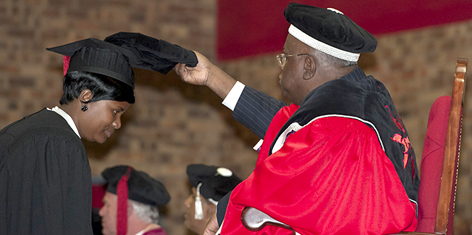Latest News Archive
Please select Category, Year, and then Month to display items
13 August 2024
|
Story Anthony Mthembu
|
Photo Sibahle Dayimani and Amandla Kulu
 Prof Peter Roseel, Managing Director of Management Consulting and Research – a spin-off of the Catholic University of Leuven in Belgium; and Prof Nicolene Barkhuizen, Director of the UFS Business School.
Prof Peter Roseel, Managing Director of Management Consulting and Research – a spin-off of the Catholic University of Leuven in Belgium; and Prof Nicolene Barkhuizen, Director of the UFS Business School.
The Business School at the University of the Free State (UFS) hosted Prof Peter Rosseel, Managing Director of Management Consulting and Research – a spin-off of the Catholic University of Leuven in Belgium – for a guest lecture during his visit to the UFS Faculty of Economic and Management Sciences (EMS).
The guest lecture took place on 19 July 2024 in the Business School Auditorium and was attended by academics from the UFS.
Reflecting on the lecture
The lecture presented by Prof Rosseel focused on how combining strategy, strategy implementation, culture transformation, leadership, and learning successfully leads to sustainable growth, creates engagement, and delivers tangible results. Throughout the lecture, Prof Rosseel spoke about how experts tend to make bad leaders and therefore stop change from happening within an organisation. In fact, he highlighted that, “Experts stop change from happening within the workplace because experts, by definition, look through the eyes of their expertise, but you cannot reduce the world to different forms of expertise, as it is holistic.” As such, he argued that to change an organisation, one must see things from the point of view of others.
Furthermore, Prof Rosseel delved deeper into the hierarchical operating model within organisations. He indicated that the above model should be one community within organisations; however, unfortunately it is not. This is because organisations are made up of several departments such as finance and human resources. As such, he regards these departments to be silos that could prove to be detrimental to organisations, as each silo can create its own culture as opposed to an organisational culture. These are some of the points he discussed throughout the lecture.
After the lecture concluded, the audience had the opportunity to engage with Prof Rosseel on his viewpoints. In fact, Lyle Markham, Academic Head of Department and Lecturer in Industrial Psychology at the UFS, was one of the audience members and described the lecture as insightful.
Qwaqwa Campus honours academic excellence
2014-05-21
 Photo: Sonia Small (Kaleidoscope Studios)
Photo: Sonia Small (Kaleidoscope Studios)
Photo Gallery
Our Qwaqwa Campus was this past weekend a hive of activity when graduates, their parents and well-wishers descended on the campus to honour outstanding academic excellence during the Winter Graduation ceremonies.
On Friday graduates from the Faculty of Humanities, as well as the Faculty of Economic and Management Sciences, were addressed by Tommy Makhatho, Managing Director of the Qwaqwa-based Bibi Cash and Carry.
Makhatho urged graduates to continue working hard way beyond their graduation day and to dream big.
“Dream big and don’t let your poor background hold you back,” Makhatho said.
“Don’t let people say you can’t or that you will fail. Take up one idea. Make that one idea your life, think of it, dream of it, live on that idea, let your brain, muscle, nerves and every part of your body be full of that idea and leave every other idea alone. This is the way to success. If you don’t build your dream, someone else will hire you to help them build theirs,” said Makhatho, the winner of the 2013 Sanlam/Business Partners Entrepreneur of the Year and Job Creator of the Year awards.
On Saturday, graduates were treated to yet another moving message by eNCA’s news anchor, Mabale Moloi, herself a graduate in Biological sciences.
“If there is one ability that we should all practice on a daily basis, it is work ethics. This is a value based on hard work and diligence,” Moloi said.
Moloi further shared her views on what makes excellent work ethics.
“There are five very important factors of work ethics that we all need to be aware of. One of them is reliability. This means how committed you are to completing a task that is given to you within a particular period of time,” said Moloi.
“The second one is dedication. This means how prepared you are to go the extra mile in completing a job or your studies. Thirdly, one’s level of productivity is very important in having an excellent work ethic. This refers to giving the best of yourself, even to the extent of surpassing what is expected of you.”
“Fourthly, there is co-operation. We all must understand the value of team work and how it leads to success. And this, when paired with character, self-discipline and strong personality, will distinguish you from anyone else,” Moloi added.
Among the more than 800 degrees, diplomas and certificates conferred, were three PhDs in Physics, Polymer Science and Zoology, respectively. Four Masters of Science degrees were conferred cum laude.